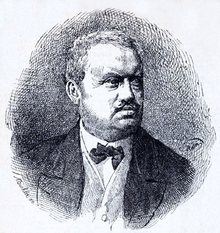Guido from Madai
Guido von Madai (born January 1, 1810 in Halle , † November 24, 1892 in Homburg in front of the height , province of Hessen-Nassau ) was a German administrative lawyer in the Kingdom of Prussia .
origin
His parents were Karl Wilhelm Samuel von Madai (* December 25, 1777; † November 20, 1851) and his wife Marianne Charlotte Wilhelmine von Schubaert (* March 28, 1772; † 1862), divorced de la Motte Fouqué . His maternal grandfather was Major General Anton Ernst Gottfried Eberhard von Schubaert . The paternal grandfather was the councilor and medic Carl August von Madai from Halle. Karl Otto von Madai was a cousin.
life and work
Madai studied law at Friedrichs University from 1830 to 1834 and became a member of the Corps Saxonia Halle in 1832 .
In 1839 he entered the Prussian civil service. In 1848 he was appointed head of the district of Kosten ( Poznan Province ). After the occupation of the Free City of Frankfurt and the suicide of the last mayor Karl Konstanz Viktor Fellner , he was appointed civil commissioner for the city and the area of Frankfurt am Main on July 28, 1866 . After the annexation of the Free City by Prussia and the entry into force of a magistrate's constitution , he became the first police president of Frankfurt on October 1, 1867, and district administrator of the Frankfurt district on October 10 .

Madai maintained a cooperative administrative style and implemented a comprehensive reorganization of the Frankfurt police and the executive in the city and the rural communities of the district. Despite the hostility to Prussia that prevailed after the violent annexation in Frankfurt, he was recognized in Frankfurt, so that the citizens said goodbye to him when he accepted a call to Berlin on August 12, 1872 as police chief . During his tenure in Berlin, he arranged for the installation of public urinals , which later became known colloquially as the Madai Temple .
Madai left on October 19, 1885 as Wirkl. Go Active service advice . He then moved to Wiesbaden and then lived in Homburg vor der Höhe. He died there on the night of November 24, 1892 at the age of 82.
He was buried in Cemetery II of the Jerusalem and New Churches in Berlin. He rests there by the side of his first wife Marianne nee. von Lattorff (1811–1880) and their son, Lieutenant General Karl von Madai (1844–1934). Only the base with the inscriptions remains of the grave monument for Guido von Madai.
See also
literature
- Wolfgang Klötzer (Hrsg.): Frankfurter Biographie . Personal history lexicon . Second volume. M – Z (= publications of the Frankfurt Historical Commission . Volume XIX , no. 2 ). Waldemar Kramer, Frankfurt am Main 1996, ISBN 3-7829-0459-1 .
- Handbook of the Prussian Nobility , Volume 2 (1893), p.416
Web links
- Madai, Guido of. Hessian biography. (As of February 17, 2020). In: Landesgeschichtliches Informationssystem Hessen (LAGIS).
- Madai, Guido von in the Frankfurt personal dictionary
Individual evidence
- ↑ Kösener Corpslisten 1930, 64 , 109.
- ↑ Guido von Madai † . In: Berliner Tageblatt , November 24, 1892, evening edition, p. 4.
- ^ Hans-Jürgen Mende : Lexicon of Berlin burial places . Pharus-Plan, Berlin 2018, ISBN 978-3-86514-206-1 , p. 234.
| personal data | |
|---|---|
| SURNAME | Madai, Guido of |
| BRIEF DESCRIPTION | Prussian civil servant, district administrator and chief of police |
| DATE OF BIRTH | January 1, 1810 |
| PLACE OF BIRTH | Hall |
| DATE OF DEATH | November 24, 1892 |
| Place of death | Bad Homburg vor der Höhe , Hesse-Nassau province |
